#statebuilding
Explore tagged Tumblr posts
Text
Why Arnor Failed as a State

So in lord of the rings, Aragorn, the titular returning king of the Third book/film, is the last descendant of Elendil, the first High King of Arnor and Gondor.
The entire plot is about how the royal family finaly, after all these years comes home to Gondor in the south from the cold, hard north, where the other realm of the Dunedain failed.
That said we are never really given a particularily detailed breakdown of why Arnor ultimately failed beyond the obvious military one(It was defeated by the rising power of Angmar before that too crashed and burned), the geographics one(the population never really managed to reach the level it could have, and that was before the plague), and the political one(the realm split into 3 lesser realms that squabbled).
On paper these seems easy enough reasons for why the northern realm crashed and burned, but once you actually start digging into it, it becomes pretty obvious that unlike Gondor, Arnor had some very serious fundamental problems that it never really managed to fix, which brought it down in the end.
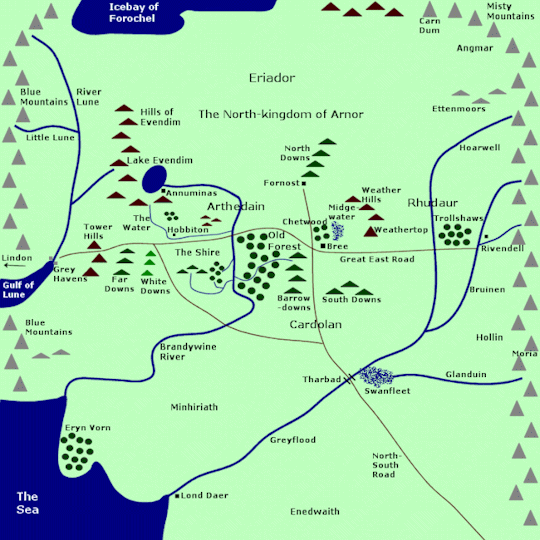
1. It mishandled it's amazing geopgraphy
Looking at Arnor from above, it seems to have ALL the advantages. It has mazsive, open fertile plains, 2 great rivers, mild climate except for the far borth, clear, easy to defend natural boundaries, with the only open pathway into the realm being the hard to pass through corridor feom forodwaith.
Politically apeaking it was also set for success as the realm had managed to unify all the local peoples within it's borders underneath its banner, which they were content with for a very long time.
So with all of this in mind, where did Arnor go wrong?
It failed to harness it's rivers, that's how.
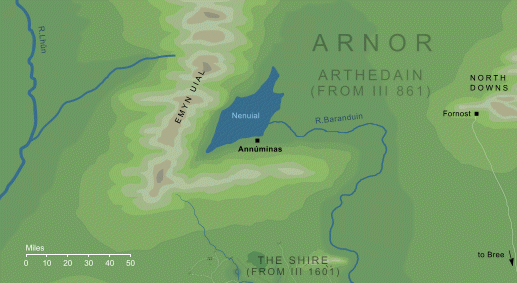
When choosing the place for capital for the new realm, one would expect it to be on one of the rivers, either at the mouth, or at an important spot.
The Dunedain chose to build the capital Annuminas at the great lake from whoch the Baranfuin/brandywine river originates from.
This isnt a... A terrible choice for a capital.
It allows the royal family to dominate the trade flowing up and down the river by controlling the spot where you can build ships, and have a massive riverrine fleet stationed in case of conflict.
So whats the problem?
The Dunedain never dredged either of their rivers, thats the problem.
Rather than wideding the bottom, to allow bigger, more usefull ships to pass up and down the river for transport of food, trade goods, and troops, Arnor instead did the exact opposite, and not only let natural fords stand, but built bridges that would prevent any trading river network from flourishing.
As far as i can tell, Arnor didnt have any particular noteworthy ocean navy, but even if Arnor was never going to invest into one such, the fact that they never did the work to make their rivers into a fountain of wealth, trade was one of the major reasons for their big decline.
But if they didn't invest into making their rivers more navigable, at the very least they would invest in horse power, in order for their people to travel quickly across the plain, allowing a caravan based trade netowork to do what rivers did not, right?
Well, no, and that leads me into my next point.
2. They Failed to turn into a cavalry based military, economic force, or political one
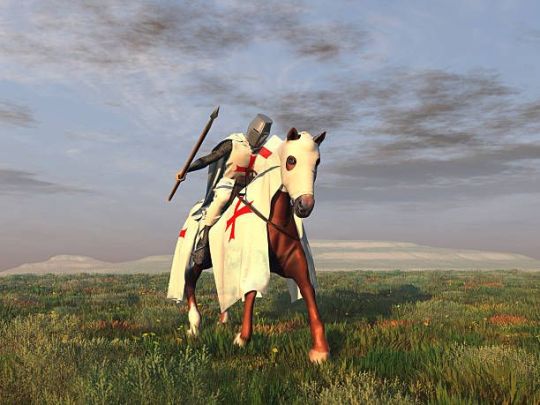
When the last king of Gondor(then prince) before Aragorns coming near a millennia later, came to destroy Angmar with a truly stunningly large relief force at the end of Angmar's power, he noted to his surprise just how perfect Arnor's plains would be for his cavalry in the task ahead of him.
And he was right. While it was the overhwelming numbers that won the day, it was the cavalry that was the main star, and allowed the army of the west to sweep over Angmar and end it forever with such ease.
With this in mind, it brings the question of why didnt the Arnorian Dunedain switch over to a completely horse based army, or at the very least make knights the shocktroops of the military the way Gondor did?
The reason seems simple enough.
Gondor was forced to fight endless wars against all of its neighbors and had to constantly adapt and change and improved, while Arnor was at peace for the better part of a millenium before it broke.
When the successor state of Arthedain had to adopt to new warfare, it always found itself outnumbered, and from the accounts of it's wars with Angmar, what they ended up doing was simply rely on powerful fortifications to fight defensive wara, and it's alliance networks to rally addiational troops.
Not strategies withouth merrit, but it's clear that Arthedain never managed to become a particularily great military powerhouse... But it could have if it had changed over to cavalry as the main feature of the army.
Instead they relied on what the numenoreans of old did. Arrow, sword and shield.
They no doubt had mounted troops of some sort, but it was clearly not their speciality just looking at how their successors, the rangers of the north prefer fighting.
But the fact is, Arnor should have had Cavalry centered armies from the very start, leaving behind the old Numenorean way of fighting the moment they realised all their future fighting would be on open plains.
However, this lack of focus on horses had another side effect. One that along with their squandering their rivers would contribute to another problem.
3. A lack of integration of the kingdom's ethnicities.
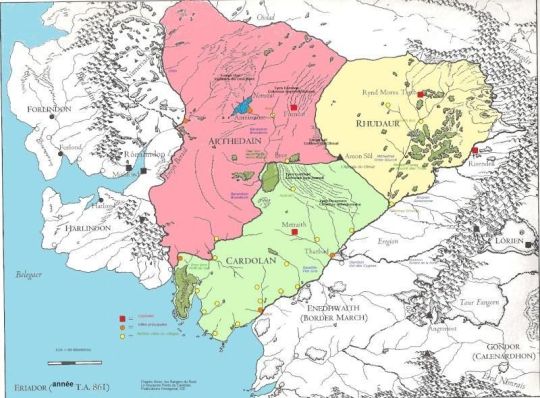
When Arnor broke off into 3 different realms, while the impetous was 3 sons fighting for control, when you look at the bigger picture, its clear that what actually happened here is that the 3 realms broke off very neatly along the kingdoms 3 main ethnicities, who each backed their own prefered candidate.
Arthedain, the biggest and strongest, centered around the heartland was populated by mostly ethnic dunedain, along with breemen as a smaller ethnicity.
Cardolan was ruled by a dunedain elite, but the ethnicity that dominated was the natice, pre numenorean population who were centered around the barrow tombs they would later be buried in(and would be corrupted by the witch king).
And finally Rhudar was also ruled by a dunedain elite, but the real power behind their revolt against the capital was the natice hillmen, who, being dissatiafied with Dunedain rule, and fueled by ambition decided to ally with Angmar in a bid for supremacy(only to later be exterminated by angmar once they no longer served their purpose).
What we see here is a very clear breakdown of the kingdoms, caused by a failed integration policy.
Clearly Annumias and later Fornost failed to bring these minorities into the fold successfully the way Gondor did eith its minorities, who became proud gondorians.
And we can in large part blame this on the capitals inability to project a sense of unity across the land. Which would have been easy to do if they had successfully tamed and harnessed their rivers, making all 3 corners part of a connected riverrine network, or had used horse based travel and trade as a matter of course to ensure everyone was connected into one economic and political policy.
Its very telling that the only people the Dunedain successfully integrated into their realm were the two minorities who lived right by the capital of Fornost(The hobbits and Breemen). Because these were the people who lived close enough that you could actually get there by foot at a reasonable time.
So with all of this in mind, there is a question to be raised. Why did Arnor squander all of it's natural advantages so badly?
Well i've gone over the military one. A stupily long amount of peace made the realm unprepared for innovation that allowed Gondor to become a powerhouse.
But no the real reason why the Arnorians would have seen no need to make changes to bolster trade, in and outside the kingdom, is due to a factor i have not gone over yet.
4. Trade mistakes.
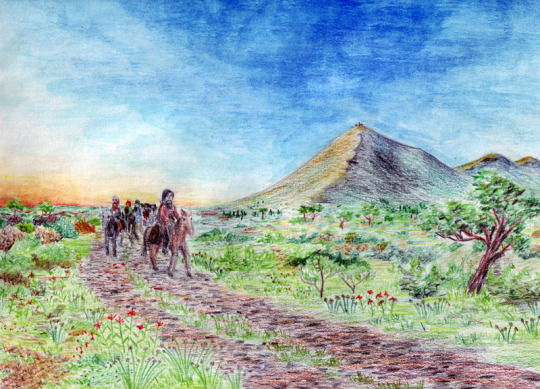
Arnor and Arthedain both sit on an ancienct road used by the dwarves, both from across the misty mountains in the direction of rivendel, but also from gondor, and far more importantly for this dissection, during both Arnor and Arthedain's lifetimes, this road systwm would have been used by Khazad-Dum, Moria, at it's height.
All 3 directions heading to the Dwarves mines in the blue mountains and the great harbors of the Elven realm of Lindon.
It would in short, be one of the most lucrative trade routes of the age.
But, and this is critical, it was not a network Arnor actually had to do some work to take a advantage of.
They did not need to make caravans, or build trade fleets, ocean or riverrine. Hell, they didn't even need dedicated traders of their own.
They were middle men, who by virtue of sitting right on this route got to toll and harness the wealth this route generated withouth hacing to do any real work.
And that, ultimately was the problem. They didnt need to innovate. They didnt need to adapt and improve and put their land to full use, because all the wealth they could possibly use was there withouth work.
And that sucks, because clearly Arnor had A LOT of products they could have sold abroad. We can tell that just by looking at it's most prosperous successor state(the shire) and looking at what sort of technology they inherited from their original overlords.
The hobbits of the shire has paper mills, clockmakers, dye industry, matches, bound books, door knobs, integrated locks and latches, and on and on. Compare it to rohan, and they are centuries ahead in tech by our standards.
It's often easy to forget(give tolkien was clear that hobbits just did not move past a certain point in techonology) that by the standards of the day, the Hobbits are very technologically advanced compared to most... And ALL of that is things they inherited from their overlords.
Wheter Arthedain and by extension Arnor invented all of these technologies themselves(as there are a number of things clearly not found in gondor it cant all have been inherited from numenor), or they adapted it through Trade with Khazad Dum or Lindon, improved upon such foreign concepts, or kore likely a mixture of all of these, it's clear that Arnor had the capacity to make these, and by extension the fact they are still around after the kingdom fell, in the form of the hobbits being self sufficcient(otger than presumably the raw metal materials they trade for with the dwarves) means this was not some exceptional level of tech for the kingdom.
It was the kingdom's standard, and if they had been interested in actually exporting these things abroad, Arnor would probably have been more wealthy than Gondor by a far margin.
But they didnt. Because they didnt see any need to innovate their trade capacity in such a manner. Which in turn led to them not harnessing their lands capacity for cheap, easy transportations, which in turn led to them not integrating their people the way gondor(who's people are all connected through the sea and Anduin, and what comes with them), which led to them being far more divided than they should have been.
And while their long period of peace allowed them to overtake Gondor in so many things, when it came to military advancements, they were not only voefully behind, but when it came time to innovate, they lacked both the resources, and the spark to truly overhaul their military and tactics, instead relying on the same old classics until it brought the kingdom crashing down.
#arnor#gondor#numenorians#technology#meta#trade#military#lord of the rings#tolkien's legendarium#statecraft#statebuilding
7 notes
·
View notes
Text
Today, the PA lacks any political legitimacy to mask its role as a second South Lebanon Army for Israel. The continued theft of land and the denial of rights of the refugees of the Gaza Strip, as well as the rest of the Palestinians, bestowed a duty upon Hamas and the resistance factions to launch the attack to break the status-quo. Oslo failed to free the Palestinian prisoners as promised by PLO officials, and the right of return was similarly sidelined; the Great March of Return in 2018 was crushed by the kneecapping of protestors in their hundreds. The international community cheered on, hoping to trap both Gaza and the West Bank with its own standards of passive resistance, statebuilding, and individualist economic prosperity that hides itself behind the veil of a collective effort to produce the New Palestinian to the world. The significance of the October 7th assault thus becomes clearer: it was an attack not only against Israeli settler colonialism, but also against the fundamental discourse that underlies the PA. It broke the taboo on centering Palestinian rights through the lens of decolonial and revolutionary armed struggle. More importantly, it scathed the colonial hubris of a nuclear-armed beast that boasts of its weaponry and supposed military superiority to the world when ‘mowing the lawn’ in Gaza. No wonder, then, why the international community is cheering on the destruction of Gaza and the elimination of resistance. Out of fear that Hamas would break the perpetual stalemate that the PLO signed on to in 1993, the US wants to quench the Zionist bloodthirst that ensued after October 7th through JDAMS, Delta Force squadrons, and a media clergy that parrots every Israeli army claim that demonises not only the Resistance, but the entire population of Gaza. The entire Israeli political spectrum is united around portraying Palestinians as Nazis, ISIS members, ‘children of darkness’, as well as human animals in order to manufacture worldwide consent for the continuous bombardment of the Gaza Strip. It is already clear that October 7th will become a landmark moment in the history of Palestinian resistance against Zionism, its benefactors, and its local agents. The PA, US, and Europe are encouraging the massacre and total siege of the Gaza Strip, not only because of their inherent interest in the continued existence of Israel on Arab land, but also because of their frenzied desire to try and restore the status quo, an imagined reality that existed before October 7th. Attempts to soften Hamas’ position on liberation via the Quartet and Qatar never bore fruit, as evidenced by what has transpired since. The failure of the peace dividends to thwart the Palestinian people, the collapse of the political discourse that masks securitisation behind a national goal, and the continued will of the resistance groups in Gaza to fight despite an international siege and soft power tactics to entice them to stay silent – all of this will pave the way for a more revolutionary discourse with regards to liberation. The era of pseudo-statebuilding is finally behind us, and an age of liberation is coming.
136 notes
·
View notes
Text
It’s quite obvious that “A People without a Land for a Land without a People” is not a call to displace a population that Zionists denied existing or thought “didn’t deserve” to be there.
It either means, as many claim, that Zionists preferred to create new settlements such as Tel Aviv, as opposed to gentrifying Arab neighborhoods in (surprisingly) small urban centers. The land was underpopulated, dilapidated, and the environment was eroded. There was a unique opportunity to reverse a centuries long process of economic and demographic decay. The Levant was the Rust Belt of the Ottoman Empire. Jews and Arabs started moving there by the tens of thousands when economic opportunities started springing up again. This was in part thanks to Zionist… settlers? Immigrants? Whatever you call them.
Or that phrase means that the Land did not have an independent national identity. The Zionists perhaps naively thought that the local Arabs, Druze, Armenians, Circassians, and everyone in between would more or less be content to let Jews show up and statebuild and that all would come together to identify as something new. Not Ottoman, not Syrian, not any individual clan or tribe or ethnic or religious identity. That returning the Jewish spirit and character to the land the land itself would flourish and everyone living on it would thrive. And that does sound a little haughty and arrogant but it’s hardly a call to depopulate a region. Nor is it a shoddy attempt at covering up ethnic cleansing by saying “what do you mean no one was here to begin with 🤭”
But when a Jew/Israeli/Zionist speaks, the Rule of course is to proceed with the worst possible interpretation. Jews do love pissing on the poor I heard.
29 notes
·
View notes
Note
Books you would recommend on this topic? Colonial, post colonial, and Cold War Asia are topics that really interest me. (Essentially all of the 1900s)
Hello! An entire century is huge and I don't quite know what exactly you're looking for, but here we are, with a few books I like. I've tried organising them, but so many of these things bleed into each other so it's a bit of a jumble
Cold War
1971 by Srinath Raghavan: about the Bangladesh Liberation War within the context of the Cold War, US-Soviet rivalry, and the US-China axis in South Asia
Cold War in South Asia by Paul McGarr: largely focuses on India and Pakistan, and how the Cold War aggravated this rivalry; also how the existing tension added to the Cold War; also the transition from British dominance to US-Soviet contest
Kennedy, Johnson, and the Nonaligned World by Robert B. Rakove: on the US' ties with the Nonaligned countries during decolonisation and in the early years of the Cold War; how US policy dealt with containment, other strategic choices etc
South Asia's Cold War by Rajesh Basrur: specifically about nuclear buildup, armament and the Indo-Pak rivalry within the larger context of the Cold War, arms race, and disarmament movements
Colonialism
India's War by Srinath Raghavan: about India's involvement in World War II and generally what the war meant for South Asia politically, economically and in terms of defense strategies
The Coolie's Great War by Radhika Singha: about coolie labour (non-combatant forces) in the first World War that was transported from India to battlefronts in Europe, Asia and Africa
Unruly Waters by Sunil Amrith: an environmental history of South Asia through British colonial attempts of organising the flow of rivers and the region's coastlines
Underground Revolutionaries by Tim Harper: about revolutionary freedom fighters in Asia and how they met, encountered and borrowed from each other
Imperial Connections by Thomas R. Metcalf: about how the British Empire in the Indian Ocean was mapped out and governed from the Indian peninsula
Decolonisation/Postcolonial Asia
Army and Nation by Steven Wilkinson: a comparative look at civilian-army relations in post-Independence India and Pakistan; it tries to excavate why Pakistan went the way it did with an overwhelmingly powerful Army and a coup-prone democracy while India didn't, even though they inherited basically the same military structure
Muslim Zion by Faisal Devji: a history of the idea of Pakistan and its bearing on the nation-building project in the country
The South Asian Century by Joya Chatterji: it's a huge book on 20th century South Asia; looks at how the subcontinental landmass became three/four separate countries, and what means for history and culture and the people on the landmass
India Against Itself by Sanjib Baruah: about insurgency and statebuilding in Assam and the erstwhile NEFA in India's Northeast. Also see his In the Name of the Nation.
I hope this helps!
51 notes
·
View notes
Note
Please share some of your partner's insights. MLP x 40k is a fantastic moral crossover, both show the failacy of reliance on supposedly all-powerful god emperors for a "highly structured stable society"
also the similarities between celestia and big E, as well as just the *place* of ponies in their world being weirdly similar to humans in 40k
to paraphrase: "If I had a nickel for every time ive seen a near-deific immortal ruler that saved their kind from certain doom and brought them into a new age of 'grandness' but was so busy statebuilding they create a schism against their own family that almost wipes out their entire species and is only barely won at the cost of ending scarred for life (and leaving the society they built a mangled caricature of the original intention), I'd have two nickels."
that's right the ponies had a horus heresy
8 notes
·
View notes
Text
Look, I love 4X with competition and conquest, but I wish there was, like, a "world peace" or "statebuilding" mode, where you just expand, do diplomacy and deal with random events without needing to conquer your neighbors, you know. Just as a relaxation thing.
Like how in Stellaris all the galaxy unites to deal with late-game emergencies, but without the super-tough battles that come with it.
5 notes
·
View notes
Text
I categorically reject the Netanyahu and Likud position of Israeli control from the Jordan west. Palestinian statehood and sovereignty are necessary from a human rights perspective, as well as for long-term Israeli security. I recognize that many Israeli acts have been in bad faith, or had ulterior motives. Sharon disengaged from Gaza in order to secure a permanent Israeli presence in the West Bank. His separation barrier did not hew to the Green Line, but took significant chunks out of the West Bank. Peres continued to develop settlements in order to create favorable “facts on the ground” when bargaining over final borders. Rabin, after Oslo, admitted that he did not envision full sovereignty for Palestine. Israel has repeatedly collaborated with the Palestinian Authority to undermine and sideline pragmatic Palestinian statebuilders like Salam Fayyad and Bashir al-Masri, who would have been effective partners for peace. Israel has played a part in bringing us to where we are today.
Nevertheless, it is Israel that has put forth concrete proposals for a Palestinian state. It was Zionists who accepted less-than-ideal partition plans in order to have something. It is the Palestinians who have always said “no”, offering no solution in return except effective Arab conquest from river to sea. Even Palestinian de facto acceptance of a two-state paradigm at Oslo was predicated on their believe in a “right of return” that would have resulted in two Palestinian-majority states and no self-determination for Jews anywhere.
So now leadership of both peoples is equally inflexible. This merely indicates that both peoples need new leadership desperately. As it stands, only 15% of Israelis want Netanyahu to remain prime minister after the Gaza campaign is completed, and there are mechanisms to enable his removal. How are Palestinians to be granted a new, reformist administration from the rubble of their failed rejectionism? We will see.
2 notes
·
View notes
Text
I was hopeless, but the revolution was inevitable since before I was born.
The Zapatistas have always been legend in my heart. Somewhere, far beyond the horizon to the south, the embers of resistance still burn hot in that place, in that place the red star flies free. In September of 1997 the venerable Subcomandante Marcos of the Zapatistas penned The Fourth World War Has Begun, a brief treatise which has wholly shifted my perspective on the global socialist resistance. In this work, which can be read in full here, the Subcomandante lays bare the necessarily incomplete seven-piece puzzle of the material condition of the world under neoliberal subjugation.
The seventh piece of the global puzzle, the pockets of resistance, was I think the piece I was missing most dearly, caught up in my delusions of old-world revolution and the hopelessness I felt in the struggle. As we live and breathe in the twenty-first century, the predictions of Marcos made in 1997 prove themselves more true by the day, and I see now that, as Che likewise postulated, the material conditions of resistance are created by resistance.
The American politic is fracturing. Cracks now form in the great stone visage of the empire, liberal politics of old prove themselves a sickly old man in the face of the radicalization of liberation and reaction. Since before our births the revolution has been inevitable, for the lifespans of every socialist to come before us, the countless who lived and died seeing not one free day in their lives, but I see now that the inevitability of the revolution is contingent upon the organization of resistance. Over the past decade we have seen in our nation huge upswells of unorganized resistance, countless of the downtrodden marching in the streets and disrupting the modes of commerce, and this precedent now enables us to preform the unprecedented. The time has come for the workers and the outcast to pry apart the fractures in the face of neoliberalism, and to establish organized pockets of resistance within the United States.
It is a peculiarity of our time and place that the pockets of resistance we Americans are to form are to be nonmilitant; the fact of the matter is that no effective resistance can be presented through the use of violent means in this nation at this time. Rather, a pocket of American resistance must be a focal point of revolutionary agitation, not wholly dissimilar to the theory of foca proposed by Che, and perhaps best precedented by groups such as the Black Panther Party of the anti-war movement. A pocket of resistance can be formed in any place and at any scale, and indeed the constant boiling of unorganized resistance is a necessary precursor to what I shall today propose: the establishment of a new precedent of organized socialist resistance.
The first and foremost requisite factor of resistance organization is the acquisition of land and means of production into the hands of the resistance. A non-militant pocket of resistance is afforded the unique opportunity to operate openly and accumulate resources within the free market. The long term objective of the organized resistance, before revolution even comes onto the table, must be the establishment of dual power independent of the neoliberal capitalist order; nothing less than the establishment of a resistance market and a resistance economy within the United States, a process which has already begun with the perpetuation-in-earnest of worker cooperatives, will allow the resistance to begin the process of statebuilding while remaining in the good graces (or atleast the apathetic dismissal) of those who hold the reigns of power.
The second requisite factor of resistance in the United States will be the militarization of our organization. Note here that I advocate not for militancy in my gesture towards militarism; rather, my suggestion is to adopt elements of military organizational theory into our nascant resistance; in particular regard recruitment, command, and apoliticality. Recruitment is of the foremost importance of these elements: an organized resistance must form the capability to accept, house, train, and put to work committed recruits; my vision is of pockets of openly-operating resistance, which make themselves impossible to miss and who have the capability to enlist all comers. Particular emphasis goes on the usage of "enlist" here; a standardized and methodical approach to recruitment must be developed, and in short order what shall be produced will itself be the better part of the material conditions necessary for revolution. Command and apoliticality go hand-in-hand in their counterintuitive presence: a democratic movement cannot hold a traditional relation to command, and a revolution can hardly be apolitical; rather, my feeling here is instead a desire to prepare in advance for the inevitable fracturing endemic to all socialist projects. The resistance movement must be apolitical in the sense that the specificity of it's politics must not extend beyond the sturdy bones of capitalist critique and faithful democracy: the purview of a pocket of resistance is the establishment of a power parallel to the state, but the organized resistance movement itself must be prevented from exerting political power in the new world it creates lest it become yet another bolshevik tyranny.
The forms of resistance which are most effective in the United States seem to me at this time unclear. Conventional protest has taken the center stage in the twenty-first century, from Wall Street to Seattle and everywhere inbetween, and while substantive change has yet to occur as a result of protest it has been instrumental in the radicalization of the left. Organized resistance's primary mission ought, I think, be in the execution of organized protest, to appear (in uniform or bearing shared symbols) and create highly visible obstructions of commercial activity. The obstructions should be neither insignificant nor indiscriminate: the mission should be the visible obstruction of opportunistically chosen targets with the objective of attracting recruits and accruing material support for the resistance organization (which will, atleast in our present stage, be necessarily local).
For all my talk of organizing, this has been a pretty unorganized ramble. The Fourth World War Has Begun has opened my eyes to resistance as a concept in a way I have failed to grasp before. It's the sort of paradigm I could see my entire life through, and for the first time in my life it feels as though a glimmer of light has reached my from the end of the tunnel. And so as Subcomandante Marcos concluded: "...it is necessary to build a new world. A world in which there is room for many worlds. A world capable of containing all the worlds."
2 notes
·
View notes
Note
If one thinks about it, Merlin the Elder's presence actually helps Merlin the Younger to grow from being merely a meat shield for Arthur.
Merlin: *points out flaws in evil plans*
Weekly villains: *furiously writing notes*
Younger Merlin: Will you stop!?
Starz Merlin: look... here's what you should do
BBC Merlin: grrgrrrr
Starz Merlin, handing him paper and a quill: Did you know that your Morgana bullet journals her notes? It's actually good! Mordred has his notes stored in magical voice recordings using druid technology. It's pretty neat actually. All you have is Gaius's old books. Do you even keep track of your spells? Look... i'd actually have Morgan personally tutor you tbh.
BBC Merlin: no way! she's evil! I don't need these!
Starz Merlin: (looks him long and hard in the eye)
BBC Merlin: WHAT?
Starz Merlin: You need serious intervention, boy.
.......................
BBC Merlin (the character) needs serious political science, philosophy, sociology, psychology, history, economics, warfare and statebuilding courses 101 tbh. I always hate that he defeats his enemies (who had been planning for months/years) just with brute force and prodigious talent alone.
In BBC Merlin, i think Balinor could have fulfilled that role tbh. Too bad Merlin was still stuck in the cult-ish and heavily reclusive mind conditionings of cockroach Gaius and master manipulator Kilgharrah. Because of that Morgana actually got ahead of him in terms of magic and diplomatic knowledge.
8 notes
·
View notes
Note
😡Philipe
Complete lack of proper statebuilding, a weird combination of over control and utter ambivelence.
2 notes
·
View notes
Text
The Albigensian Crusade is one of the more important and the more neglected wars of the medieval era:
This book serves as a companion to the other book on the Occitan War (that conveniently skipped over the bits with the two French kings providing the first steps to the territorial linkage of what's now southern France with the northern part). That book opened and rightly so the idea of examining the concept of heresy based on actual evidence.....and yet even it has to concede that there was a select group of elites who had a kind of Gnostic aspect to their appeal and most bluntly rejected entirely the authority of the Pope and the bishops. This, more than anything else, was the real seed of the heresy and of the bloodthirsty war that followed.
In the annals of Crusading the Albigensian Crusade rivals that of the Northern Crusades for often being overlooked and yet for being one of the most revealing examples. In a sequence of bloody battles and sieges the so-called Cathars were brought to heel and then exterminated by the rise of the medieval Inquisition, which did not target witches but heretics and Jewish people at that time.
In the annals, too, of medieval civilization the Albigensian Crusade marks like the Northern Crusades a point of transition, where older entities ground against the first steps of what history would show were new paths. The establishment of a French monarchy that ruled more of France than the King of England did, the first of the many steps to imploding the various languages and cultures in the soft genocidal policies of the French state that rendered those languages and cultures all but extinct.
This war also points to the reality that medieval Crusades were international enterprises by the standard of the time in theory but in practice in Europe itself were neatly folded into statebuilding in all its unholy and bloodstained paths. There is no bloodless rise of the state, only a set of choices of very specific horrors.
And it's almost an ironic afterthought that the most famous leader of this crusade would be overshadowed by his son Simon de Montfort of the same name, the man who was a prototype of Oliver Cromwell in the eyes of Whig historians and in reality every bit the avid empire and statebuilder his father was with shorter successes and mostly a bloodied speedbump in the career of Edward I Longshanks, the warrior-king who for a time virtually united Britain until his son took over and wrecked his successes by incompetence.
7/10.
#lightdancer comments on history#book reviews#european history#medieval history#albigensian crusade#aka the 'kill them all for God will know his own' war#no the man who was said to have said that did not technically say it#but it was an entirely believable thing that he did given his writings to the Pope#it's in the same category as 'death solves all problems no man no problem' attributed to Stalin
2 notes
·
View notes
Text
"The Dedication." From the Gospel of Saint John, 10: 22-24.

During this next session of the Sanhedrin regarding the identity of Jesus, the Rabbinate discusses peaceful solutions to the problems between Rome and its people. Jesus says peace is not possible because the base of the public was too ignorant. The Romans did not permit the plebians to elevate themselves as this served their ignoble purposes. Education of the people in the Sirach, the Fern Manner is not feasible while the government is allowed to do whatever it wants. Governments that do not restrain corrupt politicians and practices on their own almost always flirt with revolution as we have seen throughout human history.
Still the discussion as to how to mitigate casualties took place. The Rab invokes a concept from the Talmud that explains how this is done. Jesus, like John is a literary embodiment of the Supreme Angel Spirit called Tawsi Melek. He is called the Central Figure, also the main aqueduct.
The cistern that is the closest to the Well of Tears is the one that will understand the meaning of the Torahs first. Before any attempts at statebuilding begin, the Torah must be consulted in order to mitigate mistakes especially during the long haul after a revolution. John says this work begins in the winter.
Winter=1134, yald, "a native son."
Jesus was born in the winter as this is Kabbalah "reception of the complaint" for "the time the heavens meet the earth."
The birth of Jesus is the most important event in human history but not because the fukchucks want to sing Isaiah 9:6 or commemorate the birth of their silly savior, but because this is ideologically the time the planet is the most receptive to the idea of global peace.
"The verb ילד (yalad) means to bear or bring forth. It's used for a woman bearing a child (Exodus 1:19, 1 Kings 3:17-18) or a father bringing forth offspring (Genesis 4:18, Proverbs 23:32), but also for a city or nation bringing forth its citizens (Isaiah 23:4, Ezekiel 16:20 - compare this with the word for mother and mother city; see אם ('am)-names like Ahiam).
Our verb is also used in a wide collection of expressions: bringing forth wind (Isaiah 26:18), the day brings forth events (Proverbs 27:1), the wicked bring forth evil (Job 15:35).
Our word is also used to describe God bringing forth, or giving birth to, Israel (Deuteronomy 32:18), and to the Son (Psalm 2:7).
The verb ילד (yalad) is not limited to individual birth. In Hebrew thought, parents bring forth not only their own children but also their grandchildren and even all further generations (also see the verb זרע (zara'), meaning to sow).
This verb's derivations are:
The masculine noun ולד (walad), meaning child (Genesis 11:30).
The masculine noun ילד (yeled), meaning a young (child or animal). This common word is used for children from babies to young adolescents, but usually girls are not covered by this word (Genesis 32:23).
The feminine noun ילדה (yalda), meaning girl (Genesis 34:4. Jonah 4:3).
The feminine noun ילדות (yaldut) , meaning childhood or youth (Ecclesiastes 11:10).
The adjectives ילוד (yillod) and יליד (yalid), meaning born (Exodus 1:22, Genesis 17:12).
The feminine noun מולדת (moledet), meaning kindred (Genesis 12:1).
The feminine plural noun תולדות (toledot), meaning descendants (Genesis 5:1), or "begettings" (Genesis 2:4; the begettings of the heavens and the earth)."
Dedication, which takes place during winter requires eight days, which are detailed in Naso. At the peak of Dedication, not mentioned in Naso is Solomon's Colonnade which contains four pillars of agurwood, AKA sandalwood, AKA the Four Vedas.
There is a reason the Vedas, which reject symbolism and ritualism utterly are placed at the top of the Jewish faith. The process of the Torah is written in a heavily encrypted format and requires puzzling of the concepts in order to register on the highly egoistic, stubborn, animal brain. Without proper math and language skills, the ethical being conjured by the Torah will not be made. He will not conclude in an enlightened being without the study of the Upanishads which are nonsense proof. We do not tolerate bullshit or nonsense during or after the study of the Vedas.
John, a thorough student of all of these urges Jewish people and Christians alike not to settle for literal interpretations of anything mentioned in a religious script, including a Messiah or any delusions His manifestation will conclude in a military victory over a regime that asserts its authority using extreme poverty:
Further Conflict Over Jesus’ Claims
22 Then came the Festival of Dedication[b] at Jerusalem. It was winter, 23 and Jesus was in the temple courts walking in Solomon’s Colonnade.
24 The Jews who were there gathered around him, saying, “How long will you keep us in suspense? If you are the Messiah, tell us plainly.”
The Values in Gematria are:
v. 22-23: It was winter. Jesus was in the Temple Courts. This is not where we want Jesus to remain. The search for the freedom of the Self is an annual process. It is all right to rinse and refresh as the Dedication Practice suggests, but it should not exclude pure apprehension of the Self at any time.
The Number is 9480, טדף, tadef, "do not get swept away."
v. 24: Tell us plainly about the Messiah. The Messiah is Tawsi Melek, the Angel of the Highest Order, the one who teaches us how to be happy. Man could not have invented this intricate Gospel or the Torah or the Vedas under extremely primitive conditions unless the angels pushed, we know this is for real. Except we must also push ourselves and this is where Jesus Christmas comes into play. Men are lazy and easily corrupted. We must periodically come together and maintain our progress, and for this reason we must return to ritual, pray to God and the gods and remember the origins of our happiness, this adorable being.
That is as plain an explanation of how to create and maintain a messianic world as you will ever find.
The Number is 10788, קזףח, kazaf, "foam, froth, and spume, fizz, anger, yeast, wrath, and surf."
=
"Gather yourselves together as a nation without shame."
The Angel of God is real, His legacy for us is dependable. As the Gospel Gemara says we have to remove the yeast, the animal germs from the bread of life and things will mend, they will become holy once again. If we observe the Winter Dedication every year, they will stay that way.
Somehow in a mere handful of verses John was able to explain all we need in order to practice religion and also let the mind run free and experience the ecstasy of a human existence. The key is to stay on the wheel, called Gilgal, and off the bell curve, called Gibeah.
The success of this depends on our collective willingness to engage in proper politics, which Jesus says emphatically were invented by God to serve, not suffer the people.
0 notes
Text
Consider Somaliland: State-Building with Traditional Leaders and Institutions
Can traditional leaders & institutions play a key role in creating more legitimate, accountable & effective governments? Explore the Consider #Somaliland in Marleen Renders' '#StateBuilding with Traditional Leaders and Institutions'
Continue reading Consider Somaliland: State-Building with Traditional Leaders and Institutions
#Books#Consider Somaliland#Democracy#Horn of Africa#Institutions#Marleen Renders#Peace Process#Politics and Government#Somaliland#State Formation#State-Building#Statehood#Traditional leaders
0 notes
Photo








Flashback to last month when we welcomed friends of Banks & Bloom across two exclusive events at The Mark to sample the client’s new ready to drink range, indulge in delicious food and #DRINKFANCY with us! With special thanks to:
@statebuildings @omgbrandevents @naturalartflowers @nestleandporter @m_eventhire @spectaclemediaau @shotbythom @angela_tsun
0 notes
Text
Kievan Rus, the Duchy of Moscow, and the Mongol Empire were all Russia at some point What are you even talking about?.. Kievan Rus was not Russia. Nor Ukraine, nor Belarus. It was its own political entity, the modern state of Russia (as well as Ukraine and Belarus) was formed several centuries after Kievan Rus slipped into disunity in XI century. Great Duchy of Moscow was a state that united most of principalities of Rus (mind that "Rus" doesn't mean "Russia") around itself and established the state from which current Russia comes from. Saying GDM "was Russia" is a huge oversimplification of a complex historical process of statebuilding. The fact that the territory of Mongol Empire partly coincides with the territory of current Russia doesn't mean Russia is a descendant of Mongol Empire IN ANY WAY. If we follow this logic, then USA is the descendant of north american indian tribes, but i suppose you understand what is wrong with this reasoning. I think later in the fic it’s implied that he takes claim to the empire because it was powerful, similarly to how former Roman states take claim to the Roman Empire. In fact, Russian rulers claimed to be the descendants of Byzantine empires ("Moscow is a Third Rome" doctrine), never the descendants of Mongol empire, so the author could use this, but they chose not to.
To be honest you’re kinda stepping out of line here. A real person did research and wrote it, and this is unconstructive and pretty rude.
Do you find my comment under the first chapter of the fic constructive enough? Because tumblr is not the only platform where I expressed my opinion. Well, if a real person did the research, then clearly the research was not good enough. I can't imagine anyone who made enough effort writing what they wrote (Alexander III's assasination by the Narodnaya Volya and many other things that I mentioned in my comment on ao3). If saying that something clearly done poorly is done poorly is rude, then I'm okay with being rude.
It’s fair to discuss historical interpretations, but it’s really not to go about it this way especially when they can see what you have to say.
Cool, it was my intention to show them my opinion on ao3! I'm ready to discuss it with them when/if they answer me.
It’s one thing to conflate facts, but it’s another to say that one portrayal of something like significance is correct and another isn’t. Personally disagreeing with analysis doesn’t make it wrong. And considering the main characters you should know it’s gonna be an unreliable narrator and not an academic perspective on history
I'm not sure if I understood your first sentence correcly (English is not my first language). But I dont agree on "Personally disagreeing with analysis doesn’t make it wrong". We have objective facts (that Alexander III wasn't killed), scientific consensus in certain topics and we absolutely can and have right to make conclusions and have opinions about the veracity of particular POVs.
Reasons you should read A Century of Snow
Character study and relationship study with rusame
Basically a history lesson (1900-2000) in the form of gay romance
Beautifully written prose and symbolism
It’s so good it prompted me to write a thesis here’s the link again https://archiveofourown.org/works/50490520/chapters/127558534

22 notes
·
View notes
Photo

Good to see my Good friend ,Former Congress member Charles Rangel in NYC 9/15/22 see more in our WorldLiberty TV @ www.worldlibertytv.org #Congressmenber #charlesrangel #harlemny #statebuilding #AlhambraBallroom #worldlibertytvpoliticalblog #washingtondc https://www.instagram.com/p/CikTr0bL2_yR95zYpx5FlJjKrYfv66HM05LvSA0/?igshid=NGJjMDIxMWI=
#congressmenber#charlesrangel#harlemny#statebuilding#alhambraballroom#worldlibertytvpoliticalblog#washingtondc
0 notes